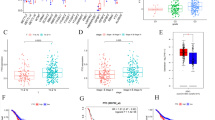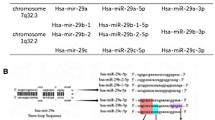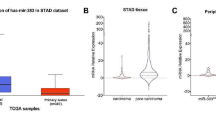Abstract
The underlying molecular pathogenesis in gastric cancer remains poorly unknown. The transcription factor myocyte enhancer factor 2D (MEF2D) participates in the initiation and development of many human cancers. However, its potential roles in gastric cancer have surprisingly not been studied. In present study, we first explored MEF2’s expression in gastric cancer, finding that only MEF2D rather than MEF2A, 2B, or 2C was elevated in gastric cancer clinical specimens. Furthermore, immunohistochemical analysis on the tissue samples obtained from 260 patients with gastric cancer revealed that MEF2D expression was significantly associated with the clinical stage, vascular invasion, metastasis, and tumor size. Gastric cancer patients with MEF2D expression showed a significantly shorter overall survival time compared with that of patients lacking of MEF2D. Multivariate analysis revealed that MEF2D expression was an independent prognostic factor for overall survival. These results indicated that MEF2D was a prognostic marker for gastric cancer. Notably, MEF2D silencing was able to reduce the proliferation and survival of gastric cancer cells. Further study revealed that MEF2D suppression significantly inactivated the oncogenic Wnt/β-catenin pathway. Downregulation of MEF2D inhibited the tumorigenesis of gastric cancer cells in nude mice. Finally, MEF2D is a direct target of miR-19, which was found to be decreased in gastric cancer clinical specimens. Collectively, we found that miR-19/MEF2D/Wnt/β-catenin regulatory network contributes to the growth of gastric cancer, hinting a new promising target for gastric cancer treatment.








Similar content being viewed by others
References
Shah MA, Kelsen DP. Gastric cancer: a primer on the epidemiology and biology of the disease and an overview of the medical management of advanced disease. J Natl Compr Cancer Netw. 2010;8:437–47.
Compare D, Rocco A, Nardone G. Risk factors in gastric cancer. Eur Rev Med Pharmacol Sci. 2010;14:302–8.
Lynch HT, Grady W, Suriano G, Huntsman D. Gastric cancer: new genetic developments. J Surg Oncol. 2005;90:114–33.
Aung P, Oue N, Mitani Y, Nakayama H, Yoshida K, Noguchi T, et al. Systematic search for gastric cancer-specific genes based on sage data: melanoma inhibitory activity and matrix metalloproteinase-10 are novel prognostic factors in patients with gastric cancer. Oncogene. 2006;25:2546–57.
Sun W, Wu Y, Yu X, Liu Y, Song H, Xia T, et al. Decreased expression of long noncoding rna ac096655. 1–002 in gastric cancer and its clinical significance. Tumor Biol. 2013;34:2697–701.
Sakakura C, Hagiwara A, Miyagawa K, Nakashima S, Yoshikawa T, Kin S, et al. Frequent downregulation of the runt domain transcription factors runx1, runx3 and their cofactor cbfb in gastric cancer. Int J Cancer. 2005;113:221–8.
Li Q, Zhang N, Jia Z, Le X, Dai B, Wei D, et al. Critical role and regulation of transcription factor foxm1 in human gastric cancer angiogenesis and progression. Cancer Res. 2009;69:3501–9.
Li T, Lu Y, Zhao X, Guo H, Liu C, Li H, et al. Microrna-296-5p increases proliferation in gastric cancer through repression of caudal-related homeobox 1. Oncogene. 2014;33:783–93.
Wang B, Cai Z, Lu F, Li C, Zhu X, Su L, et al. Destabilization of survival factor mef2d mRNA by neurotoxin in models of Parkinson’s disease. J Neurochem. 2014;130:720–8.
Black BL, Olson EN. Transcriptional control of muscle development by myocyte enhancer factor-2 (mef2) proteins. Annu Rev Cell Dev Bi. 1998;14:167–96.
Bai X, Wu L, Liang T, Liu Z, Li J, Li D, et al. Overexpression of myocyte enhancer factor 2 and histone hyperacetylation in hepatocellular carcinoma. J Cancer Res Clin. 2008;134:83–91.
Bai X, Zhang Q, Ye L, Liang F, Sun X, Chen Y, et al. Myocyte enhancer factor 2c regulation of hepatocellular carcinoma via vascular endothelial growth factor and wnt/β-catenin signaling. Oncogene. 2014.
Ma L, Liu J, Liu L, Duan G, Wang Q, Xu Y, et al. Overexpression of the transcription factor mef2d in hepatocellular carcinoma sustains malignant character by suppressing g2–m transition genes. Cancer Res. 2014;74:1452–62.
Yu W, Huang C, Wang Q, Huang T, Ding Y, Ma C, et al. Mef2 transcription factors promotes emt and invasiveness of hepatocellular carcinoma through tgf-β1 autoregulation circuitry. Tumor Biol. 2014;35:10943–51.
Shin H-M, Seoh J-Y, Chung H-Y, Choi S-J, Hahn M-J, Kang J-S, et al. Requirement of mef2d in the induced differentiation of hl60 promyeloid cells. Mol Immunol. 1999;36:1209–14.
Prima V, Gore L, Caires A, Boomer T, Yoshinari M, Imaizumi M, et al. Cloning and functional characterization of mef2d/dazap1 and dazap1/mef2d fusion proteins created by a variant t (1; 19)(q23; p13. 3) in acute lymphoblastic leukemia. Leukemia. 2005;19:806–13.
Zhao X, Liu M, Li D. Oleanolic acid suppresses the proliferation of lung carcinoma cells by mir-122/cyclin g1/mef2d axis. Mol Cell Biochem. 2015;400:1–7.
Song L, Li D, Zhao Y, Gu Y, Zhao D, Li X, et al. Mir-218 suppressed the growth of lung carcinoma by reducing mef2d expression. Tumor Biol. 2015;1–10.
Zhang H, Xue Y. Wnt pathway is involved in advanced gastric carcinoma. Hepato-gastroenterol. 2007;55:1126–30.
Cai C, Zhu X. The wnt/β-catenin pathway regulates self-renewal of cancer stem-like cells in human gastric cancer. Molecular medicine reports. 2012;5:1191–6.
Huang J, Xiao D, Li G, Ma J, Chen P, Yuan W, et al. Epha2 promotes epithelial–mesenchymal transition through the wnt/β-catenin pathway in gastric cancer cells. Oncogene. 2014;33:2737–47.
Homminga I, Pieters R, Langerak AW, de Rooi JJ, Stubbs A, Verstegen M, et al. Integrated transcript and genome analyses reveal nkx2-1 and mef2c as potential oncogenes in t cell acute lymphoblastic leukemia. Cancer Cell. 2011;19:484–97.
Nagel S, Meyer C, Quentmeier H, Kaufmann M, Drexler H, MacLeod R. Mef2c is activated by multiple mechanisms in a subset of t-acute lymphoblastic leukemia cell lines. Leukemia. 2008;22:600–7.
Lilljebjörn H, Ågerstam H, Orsmark Pietras C, Rissler M, Ehrencrona H, Nilsson L, et al. Rna-seq identifies clinically relevant fusion genes in leukemia including a novel mef2d/csf1r fusion responsive to imatinib. Leukemia. 2014;28:977–9.
Schwieger M, Schüler A, Forster M, Engelmann A, Arnold MA, Delwel R, et al. Homing and invasiveness of mll/enl leukemic cells is regulated by mef2c. Blood. 2009;114:2476–88.
Li Y, Zhang L, Nong J, Bian S, Zhao Z, Ren Y, et al. Expression of mef2d on nasopharyngeal carcinoma tissues and its influence of prognostic. Lin chuang er bi yan hou tou jing wai ke za zhi = Journal of clinical otorhinolaryngology, head, and neck surgery. 2011;25:840–2. 847.
Lohr JG, Stojanov P, Lawrence MS, Auclair D, Chapuy B, Sougnez C, et al. Discovery and prioritization of somatic mutations in diffuse large b-cell lymphoma (dlbcl) by whole-exome sequencing. Proc Natl Acad Sci. 2012;109:3879–84.
Tagawa H, Suguro M, Tsuzuki S, Matsuo K, Karnan S, Ohshima K, et al. Comparison of genome profiles for identification of distinct subgroups of diffuse large b-cell lymphoma. Blood. 2005;106:1770–7.
Zhang J, Grubor V, Love CL, Banerjee A, Richards KL, Mieczkowski PA, et al. Genetic heterogeneity of diffuse large b-cell lymphoma. Proc Natl Acad Sci. 2013;110:1398–403.
Zhang M, Truscott J, Davie J. Loss of mef2d expression inhibits differentiation and contributes to oncogenesis in rhabdomyosarcoma cells. Mol Cancer. 2013;12:1–14.
Shi J, Jiang X, Yu Z, He G, Ning H, Wu Z, et al. Znrf3 contributes to the growth of lung carcinoma via inhibiting wnt/β-catenin pathway and is regulated by mir-93. Tumor Biol. 2015;1–7.
Ma Y, Zhu B, Liu X, Yu H, Yong L, Liu X, et al. Inhibition of oleandrin on the proliferation show and invasion of osteosarcoma cells in vitro by suppressing wnt/β-catenin signaling pathway. J Exp Clin Canc Res. 2015;34:1.
Lee SC, Kim O-H, Lee SK, Kim S-J. Iwr-1 inhibits epithelial-mesenchymal transition of colorectal cancer cells through suppressing wnt/β-catenin signaling as well as survivin expression. Oncotarget. 2015;6:27146–59.
Ma Q, Yang Y, Feng D, Zheng S, Meng R, Fa P, et al. Magi3 negatively regulates wnt/β-catenin signaling and suppresses malignant phenotypes of glioma cells. Oncotarget. 2015.
Acknowledgments
The authors thank Prof. Li from the Center of Cancer Research, Boston University, USA, for the critical reading and modification of the manuscript.
Author information
Authors and Affiliations
Corresponding author
Ethics declarations
Conflicts of interest
None
Rights and permissions
About this article
Cite this article
Xu, K., Zhao, Yc. MEF2D/Wnt/β-catenin pathway regulates the proliferation of gastric cancer cells and is regulated by microRNA-19. Tumor Biol. 37, 9059–9069 (2016). https://doi.org/10.1007/s13277-015-4766-3
Received:
Accepted:
Published:
Issue Date:
DOI: https://doi.org/10.1007/s13277-015-4766-3




